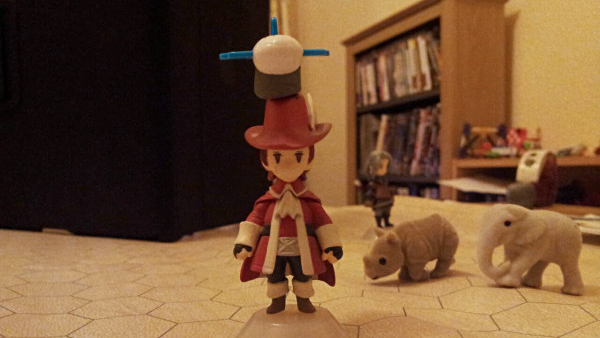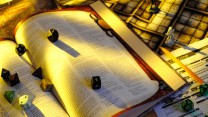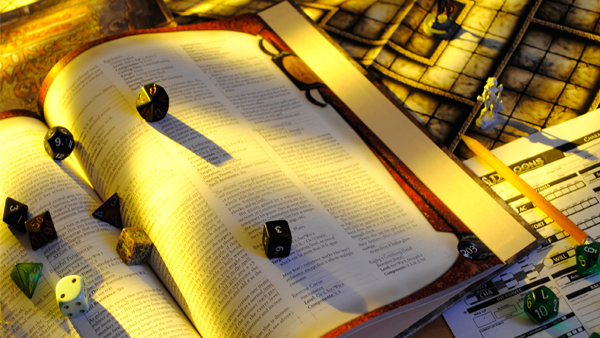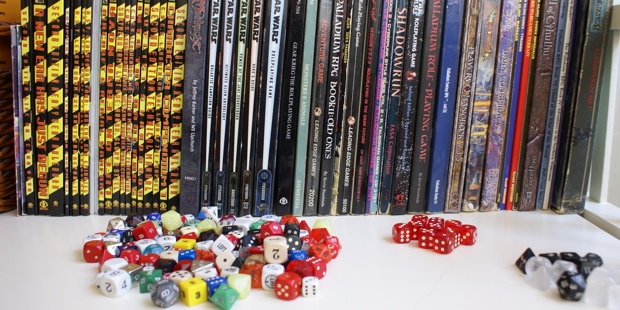So the past few weeks I’ve been quite intensively participating in a couple of role-playing campaigns, and there has been some interest in it so I figured I would share some tips on getting into role-playing.
What is Tabletop Role-playing?
Sometimes called pen-and-paper role-playing or just role-playing, tabletop role-playing is a method of gaming whereby you, and others, through the use of pen, paper, dice, and your imagination, play out the role of a character in a variety of scenarios. For the most part it’s whatever you want it to be.
Tabletop roleplaying games precede video games by at least a decade if not more, and many popular video games trace their roots right back to these pen-and-paper games. Which makes it a great hobby to pick up alongside video games. Role-playing provides worlds many of us are already familiar with, but with new storylines and plots, and a much wider expanse than anything “open world” games may provide. The internet has also provided ways for them to flourish through publishing of new systems and campaigns and the ability to join in with gamers from around the world.
Where to start
The first thing you’ll want to do is figure out which particular game you want to play. This can be quite a hard task as there are many different PnP games out there. There are fantasy settings, sci-fi settings and even modern day settings. Some of them lean more towards role-playing and storytelling, some of them more towards mechanics and battle systems. Kind of like video game RPGs. Dungeons & Dragons is the most well known franchise, and probably the easiest to get set up with given the popularity, since this leads to bigger community, availability, and much wider range of supplemental material. Many stores will encourage you to try the free section first and play with the people there to see what fits you best.
You could even use some of the RPG video games you’ve played in the past. Baldur’s Gate, Planescape: Torment, Shadowrun, Vampire the Masquerade, or maybe the upcoming Cyberpunk 2077 game.There are even fan-made campaigns built upon video games, too, such as Fallout and Final Fantasy. Choosing a system from a series you’re familiar with can remove the strain of learning new lore, allowing you to learn the rules and get into role-playing much faster. I’ve linked a few at the end of the article.
Find a party!
Unlike most video game RPGs, you’re not going to be able to play on your own. You’ll need at least three people: a Game Master (sometimes Dungeon Master), to control the game, and two players to roleplay. Finding a GM is another critical element; you’ll want someone who is fairly familiar with the rules and a good story-teller. The quality of a GM can make or break your campaign. Your choice of GM may also make it simpler to figure which game system to play, if they’re familiar with one system over another that is likely the system you’ll play. If you’re struggling to find friends who wish to join you in your role-playing endeavour then you can cast your net further. Depending on the area you live in, there may be a role-playing group at local community centres, gaming stores, or even in folks homes. If not. then realise you’re living in the 21st century and there is a wide range of sites and forums online that allow you to play with people around the world. Some sites play by post, some IRC, Skype, or via specialist tabletop programs like D&D Insider.

Get some gear
This part, depending upon the system used, can be entirely optional. You’re likely going to want rulebooks, though a DM may have these. The system might not have rulebooks but PDFs or a wiki, in which case a tablet will come in handy. A set of dice is also cheap and easy to acquire, and it’s always nice to have your own. Nearly everyone I know uses Chessex brand dice which come in a wide range of styles, so no mix-ups with other players, and reasonably priced for a box of 7 dice. If you’ve a smartphone they too can be used for dice rolls, much more customised too. I’ve used Dice Bag a bit, but prefer physical dice in the end. Up to you.
A miniature is a nice thing to pick up too. Most of the game is in your imagination, but a miniature can help as a focal point. Sort of like totems in Inception. They’re also handy in battle scenarios, though some GMs may just use counters. Miniatures can be anything you want them to be, though grabbing something from a wargaming kit is usually best, then customise to suit.
Get into the zone
This is a big part. It’s a role playing game after all and playing that role is somewhat expected. Going from video games, which no matter how non-linear or open world they may be still provide an enclosed play area, to the wide open of role-playing games can be hard and jarring. Be prepared to probe the boundaries of what you can do, but also learn to give back into the game. A video game provides much more of a framework and backstory for you; you are the dovakhin, the fateweaver, vault dweller. In a tabletop RPG you will be shaping your character at all times, from backstory through to playing the game. There’s an expectation to stick with your character traits throughout the game: not being a good character while heading the thieves and assassins guilds like you can in video games. In video games a NPCs will give you a quest and tell you where to go and what to do, but with roleplaying it is up to you (and the GM) what you do, make an active role in the story.
I should note I am still quite the hypocrite in this respect, learning to play a character instead of the system can be hard, but overtime as you learn more of your character it can get easier. Make a journal, some groups might set up a Facebook account or wiki to follow the tales of characters and what has happened. This can make it easier on everyone, especially the GM, if traits and aspirations of the characters are known. Once you’ve written down your character’s story it can make it much easier to visualise than looking at a character sheet full of numbers.
Play some more
There are hundreds if not thousands of systems and campaigns out there to explore. Once you’ve had your first taste, dive into other campaigns, have a shot at DMing something yourself. If you’re feeling adventurous, maybe take a generic game system and craft your own campaign based on your favourite lore and franchises and use the web to share it.
A few role-playing games to get you started:
Dungeons & Dragons – Classic fantasy role playing. Comes in a variety of editions.
Vampire: The Masquerade – Vampires, werewolves and the supernatural.
Rogue Trader – One of several RPG systems based on Games Workshop’s 40K franchise and the particular RPG I’m playing at the moment.
Cyberpunk 2020 – The basis of CD Projekt RED’s upcoming game.
Call of Cthulhu – Based on the H.P Lovecraft novels, also used for the same named Bethesda game.
Pathfinder – A spin-off from D&D with rules available through the “Open Games License”. Basically, the rules are free to use.
GURPS – A generic system from Steve Jackson Games.
Final Fantasy D20 – A fan-made system based upon the d20 game system.
Fallout Pen and Paper – Another fan game, based more on the original Interplay titles than Bethesda incarnations.
And so much more.
Chessex – maker and seller of dice and related materials.
Arcane Minitures – This is the kind of place to pick up a miniature. I’d suggest shopping around, especially for regional stores.
Dice Bag – a free app for doing dice rolls.
PyMapper – A program for making dungeons.
RPTools – A free online role-playing toolset.


